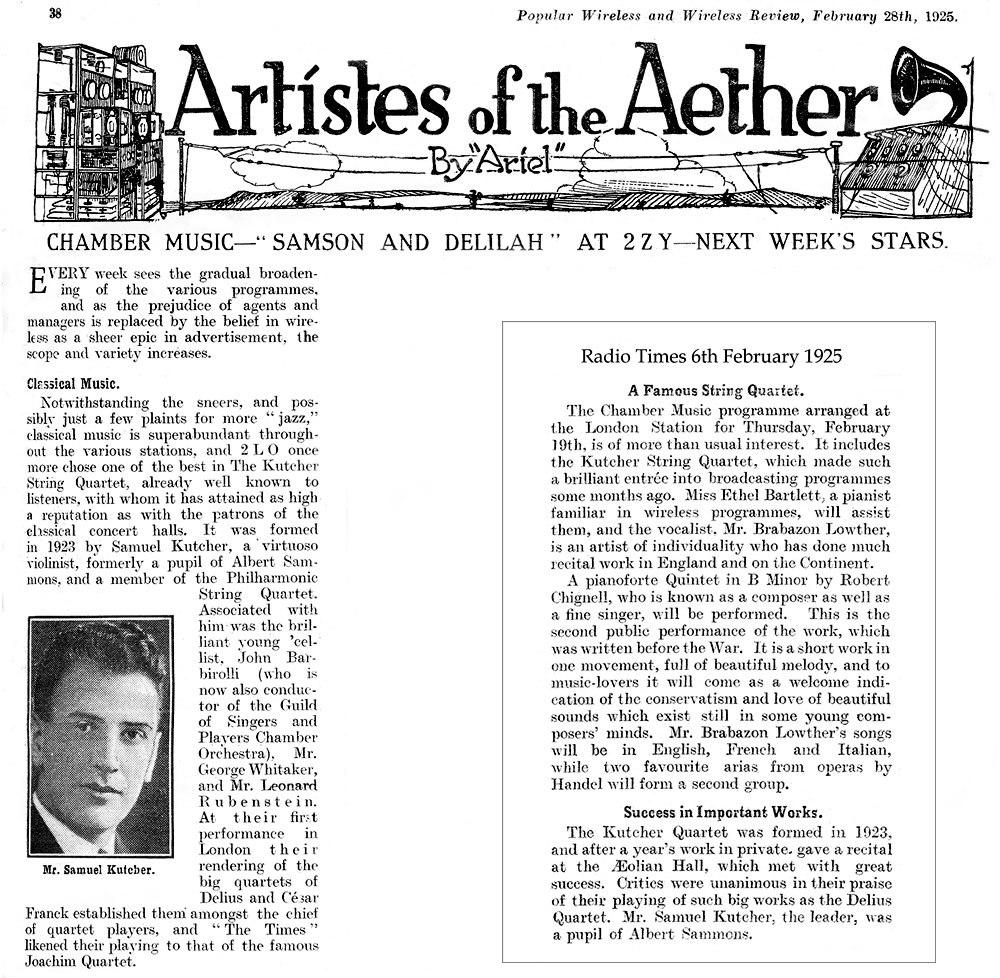1924 to 1946 Radio Performances
1920: First experimental Radio transmission in the UK. One half hour a week entertainment.
1922: More broadcasting stations set up around the UK. BBC was formed. First daily transmission from 2LO (London).
1923: First Radio Times published. The newspapers see radio as competition and refuse to print programme schedules, so the BBC launches the Radio Times in September 1923.
Broadcasts first Orchestra concert, talk programme, dance music and regular news from London.
Radio receiver licences grows to 500 000 countrywide. Annual licence fee 10 shillings (50 pence).
1924: November 19th Samuel’s first Radio broadcast with the Kutcher String Quartet .
1925: February – Kutcher String Quartet becomes established as a well known chamber music ensemble on the radio.
March – Radio broadcasts from London were being heard throughout Europe. Radio listing La Vanguardia , a Spanish newspaper – Cuarteto de cuerdas de Kutcher (top right hand corner)
May – The Kutcher String Trio, an ensemble that performed on Radio until 1940.
How popular was Chamber music on the Radio? The amount of time devoted to its broadcasting might give a clue. A survey of one week in October from 1927 to 1930 revealed the percentage of time given to classical other serious music from a total of ~ 77- 80 hours transmission.
| 1927 | 1928 | 1929 | 1930 | ||
| National Programme |
Regional Programme |
||||
| % | % | % | % | % | |
| classical music | 15.79 | 19.40 | 19.32 | 14.69 | 20.01 |
| opera (whole or part, not excerpts) | — | — | — | — | 6.22 |
| orchestral (with soloists) | 10.10 | 5.63 | 7.38 | 7.45 | 6.59 |
| chamber music | 0.64 | 3.13 | 3.27 | — | 1.83 |
| instrumental recitals | 4.73 | 5.94 | 4.12 | 2.98 | 5.37 |
| song recitals | 0.32 | 1.15 | 0.95 | 3.30 | — |
1928: Radio performance. The earliest contract from the BBC. It is not clear whether this is for Samuel only or the Quartet.
1928: June 7th – Radio Times. Orchestra Concert with Samuel Kutcher (violin) and Theresa Ambrose (soprano). In a curious description of Samuels’ early career it it revealed that Samuel ‘played half the night at dances to keep himself; going’, presumable meaning this was how he made a living at some point.
This is most probably true and alludes to the period when he left school until he joined the Army in 1917 and would have been ~ 17 / 18 years old . Around this period many older musicians would have been called up for military duty and there would have been a demand for younger able musicians to take their place. There is a similar description of the working life of Barbirolli in his biography by Michael Kennedy, in which Barbirolli, ‘on leaving school at the end of the summer term in 1916 .. was able to obtain a fair amount of freelance work … playing in everything from Henry Wood’s Queen’s Hall Orchestra to a pantomime at the old Surrey music-hall’
1928: May 5th – Samuel plays Delius.Was Delius listening in ?
|
1929: August 13th Glasgow Evening Citizen– review the Kutcher String Quartet on Radio |
1932 Empire Service launched (later to become the World Service). The first transmission is aimed at Australia, and soon there are broadcasts occupying several hours a day to five different areas of the Empire.
| 1931 – Musical Standard August – article – at least 30 broadcast in the previous two years | 1932 Times April 3rd – Review of Kutcher String Quartet broadcast. |
1934- 1938 – transmission time had increased to over 92 hours a week. The percentage of time devoted to classical music stays about the same ranging from 14 – 20%. ( Media Statistics )
1939 February 17th Radio Times. Programme for the 25th February
Sample contracts with the BBC from 1939 and 1940
1946 – Malcolm Sargents’ Birthday Party
Samuel’s last known performance on BBC Radio was for Malcolm Sargents’ Birthday Party, a radio broadcast hosted by Kenneth Horne.
1971 – Samuel’s last known contract with the BBC was for an interview on his recollections of Sir John Barbirolli for a TV program called Omnibus. His interview was not included in the final cut.














